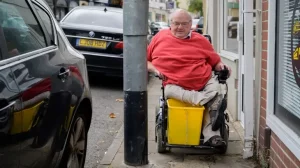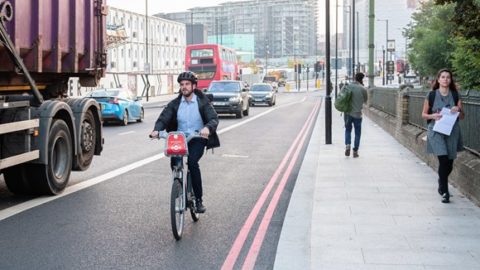A ban on pavement parking would encourage more people to walk and wheel, according to a new report by Sustrans.
Its Walking and Cycling Index (formerly Bike Life) is the UK’s biggest ever study of walking, wheeling and cycling. It highlights the issue of pavement parking in urban areas across the UK and Ireland, and has found that banning pavement parking would help 70% of all residents to walk or wheel more.
Sustrans’ latest survey gathered the opinions of over 13 million people.
The Index has highlighted several barriers which people face when walking, wheeling and cycling in their local areas. One of the main ones is the obstruction caused by pavement parking.
Sustrans surveyed more than 24,000 people from 18 cities and areas across England, Scotland, Wales, Northern Ireland and the Republic of Ireland.
Each report looks at infrastructure, travel behaviour, the impact of cycling, and new initiatives.
In its report, Sustrans found that banning pavement parking would help 70% of all residents to walk or wheel more. And 72% of residents think wider pavements would encourage them to do so.
Pavement parking is already prohibited in London and the government is now considering extending this across England. In Scotland, the government is set to introduce a ban on pavement parking in 2023.
The Walking and Cycling Index also shows that just 56% of disabled people and 55% of residents on low incomes[1] feel welcome when walking and wheeling in their neighbourhood, with only 52% of people believing it’s safe for children to walk in their local area.
This compares to 69% of non-disabled people, and 74% of those in managerial or professional roles.
People walk or wheel more frequently than any other form of urban transport, with 50% doing so at least five or more days each week.
This compares to 39% for car use, 11% who use public transport and five per cent who cycle at least five or more days each week, said the report.
However, proximity of local services and amenities prevents people walking and wheeling more, as just over half of respondents (55%) agreed they could easily get to many places they need to visit without having to drive.
A total of 79% of people support the creation of 20-minute neighbourhoods where amenities and services, such as shops, green space and GPs are located within a 20-minute return walk or wheel of where they live.
However, the research found 27% of households are outside of a 20-minute return walk of a food shop, rising to 36% of households that are not within this distance to a GP.
In the report, Sustrans found that banning pavement parking would help 70% of all residents to walk or wheel more.
Since the last report for Bike Life was published in March 2020, the organisation has been working hard behind the scenes with our partners and audiences to develop the programme.
The new report will be similar to those from 2019, but with the addition of walking and wheeling data.
This includes behaviours, attitudes, data on infrastructure and walkability as well as the benefits of walking and wheeling for residents and their city or region.
The Index also found that more than half of people surveyed (56%) want to see more government spending on walking and wheeling, compared to just 32% for driving.
The UK government currently invests £27 billion on roads in comparison to only £2 billion for walking and cycling.
Xavier Brice, Sustrans Chief Executive, said: “I’d like to thank the more than 24,000 people who gave us their time to take part in this assessment.
“Walking and wheeling should be the most accessible and desirable form of transport.
“It is of huge importance to people, especially during the current cost of living crisis and climate emergency.
“The evidence is clear that people wish to feel safe and welcome while walking and wheeling, and without parked vehicles getting in their way.
“Pavement parking is discriminatory against wheelchair and mobility scooter users, other disabled people, those with visual impairments, and more.
“The UK government’s target is for half of all journeys in towns and cities to be cycled or walked by 2030.
“Achieving this will be impossible unless we do more to make walking and wheeling more accessible and inclusive – a vital first step is to ban pavement parking.
“Governments must listen to residents and prioritise walking and wheeling for everyone.”
Find out more about the Walking and Cycling Index and download the reports.
Full article available here:- Ban on pavement parking would encourage more people to walk and wheel – Highways News (highways-news.com)
















